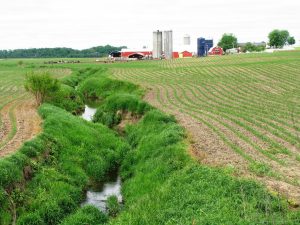The House Agriculture Committee advanced the Republican-led farm bill in a 34-17 vote early Thursday after a marathon markup that was clouded by partisan fighting about the package.
Trump Administration Rolls Back “Waters of the U.S.” Rule
Last week, New York Times writers Lisa Friedman and Coral Davenport reported that, “The Trump administration on [September 12] announced the repeal of a major Obama-era clean water regulation that had placed limits on polluting chemicals that could be used near streams, wetlands and other bodies of water.
“The rollback of the 2015 measure, known as the Waters of the United States rule, adds to a lengthy list of environmental rules that the administration has worked to weaken or undo over the past two and a half years.”

The Times article explained that, “The Obama administration implemented the rule in response to a Supreme Court decision that opened the door to a more expansive legal definition of ‘waters of the United States’ under the 1972 Clean Water Act. With [last week’s] announcement, the Environmental Protection Agency is aiming to drastically narrow that definition, a move that critics fear could be difficult for future administrations to undo because the ideological balance of the Supreme Court has shifted to the right.”
Friedman and Davenport added that,
Agricultural groups, an important political constituency for Mr. Trump, praised the repeal.
“Zippy Duvall, president of the American Farm Bureau Federation, said the water rule had prompted outrage from thousands of farmers and ranchers across the country and led to the largest effort to reverse a regulation in his organization’s history.
“‘When you take private property rights from a man who’s worked all his life,’ Mr. Duvall said, ‘that is very intrusive to him and it’s something he just can’t stand for.'”
I’ve worked closely with the Trump Administration to roll back the burdensome Obama-era WOTUS rule, & I’m glad just last week the administration took decisive action to remove this threat to Iowa. Now it’s time to pass my bill to codify a reasonable & clear definition of #WOTUS. pic.twitter.com/GMxmXNFfhg
— Joni Ernst (@SenJoniErnst) September 18, 2019
Katy Stech Ferek and Timothy Puko reported last week at The Wall Street Journal Online that, “President Trump’s administration has rescinded an Obama-era policy that expanded federal oversight and the threat of steep fines for polluting the country’s smaller waterways, furthering his deregulatory efforts in the 14 months that remain before the next election.”
“Court battles following the Obama-era rule have led to fractured rules across the country. Amid the legal challenges, the regulation is in place only in 22 states, though the Trump administration’s decision could spark its own series of court fights,” the Journal article said.
The Journal writes pointed out that, “The rule finalized [last week] restores regulatory text that existed before the 2015 rule. Property that is no longer covered by the 1972 Clean Water Act remains protected by state rules. Major waterways, such as most rivers and lakes, were already under protection of the Clean Water Act and still will be after the rollback.
“‘Our revised and more precise definition will mean that farmers, property owners and businesses will spend less time and money determining whether they need a federal permit,’ [Environmental Protection Agency Administrator Andrew Wheeler] said.”
Also last week, Associated Press writer John Flesher reported that, “Wheeler and R.D. James, assistant secretary of the Army for civil works, signed a document overturning the rule and temporarily restoring an earlier regulatory system that emerged after a 2006 ruling from a sharply divided Supreme Court.
“The agencies plan to adopt a new rule by the end of the year that is expected to define protected waterways more narrowly than the Obama policy.
“The Clean Water Act requires landowners to obtain federal permits before developing or polluting navigable waterways such as rivers and lakes. But disputes have long persisted over what other waters are subject to regulation — particularly wetlands that don’t have a direct connection to those larger waters, plus small headwater streams and channels that flow only during and after rainfall.”
And DTN writer Chris Clayton reported on Monday that, “Don Parrish, director of regulatory affairs for the American Farm Bureau Federation, said the 2015 rule wrote the term ‘navigable’ out of the Clean Water Act, leading to significantly broader uncertainty for farmers.
‘For farmers, it removes some uncertainty that rule put into place and it provides some consistency because right now, before they repeal, there’s one set of rules being implemented in one set of states and a different set of rules being implemented in other states,’ Parrish said. ‘We hope this will bring some consistency back to the process.’
“Eliminating the 2015 rule emphasizes the need for the Trump administration to finish its new rule, which should be finalized before the end of the year, Parrish said. ‘That clarity would both protect clean water [and] provide some understanding of where federal jurisdiction stops and where federal jurisdiction takes over,’ he said.”





